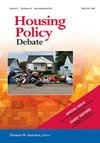Landlords and Housing Quality in Rural Georgia: Assessing the Relationship
IF 2.9
3区 经济学
Q2 DEVELOPMENT STUDIES
引用次数: 0
Abstract
AbstractLandlords play a key role in maintaining the quality of rental properties. Similarly, over the last decade, the growth of financial instruments such as real estate investment trusts (REITs) along with widespread use of LLCs allow landlords to consolidate holdings with little local oversight on housing quality. Research on both these trends has focused mainly on urbanized areas. Rental properties are also common in many rural communities, but patterns of property ownership have been understudied. This article draws from community-generated data on local housing conditions and property records to describe patterns of property ownership in five rural Georgia communities using exploratory statistical and geographic analysis. We then use statistical models to assess how housing quality is related to landlord characteristics including landlords’ locations, number of total holdings, and LLC status. Our analysis finds that large, corporate ownership is limited in these communities, and that property ownership is largely local or regional, commonly including owners residing in the Atlanta metropolitan area. We also identify that properties owned by landlords with five or more properties have a significantly greater risk of dilapidation. Policies that support rural communities’ assessment of local property conditions and increase tenant protections may improve local affordable housing options.Keywords: Landlordsrural housingGeorgiahousing quality Disclosure StatementNo potential conflict of interest was reported by the author(s).Notes1 All communities are referred to using a pseudonym.2 See https://www.fcs.uga.edu/fhce/gich for more information.3 https://getodk.org4 https://www.fulcrumapp.comAdditional informationFundingThis work was supported by the National Institute of Food and Agriculture.Notes on contributorsJerry ShannonJerry Shannon is an Associate Professor in Geography and in Financial Planning, Housing, and Consumer Economics at the University of Georgia with interests in urban development and inequality, geographic information systems, and place effects on health. His research often uses participatory methods and focuses on the role of maps and spatial analysis in shaping our understanding of hunger, housing, poverty, and neighborhood development.Kim SkobbaKim Skobba is a Meigs Professor in Financial Planning, Housing and Consumer Economics at the University of Georgia and the director of the UGA Center for Housing and Community Research. Her research focuses on the experiences of people who face the most significant challenges in securing housing and how local leaders in rural small towns perceive and make decisions about affordable housing needs in their communities.Jermaine DurhamJermaine Durham is an Assistant Professor of Housing and Community Development in the University of Georgia’s College of Family and Consumer Science. Dr. Durham also serves as the director of the Georgia Initiative for Community Housing (GICH). GICH assists Georgia communities in the development of housing and neighborhood revitalization strategies to improve their quality of life and economic vitality.乔治亚州农村房东与住房质量:关系评估
摘要房东在维护租赁物业质量方面起着关键作用。同样,在过去十年中,房地产投资信托(REITs)等金融工具的增长,以及有限责任公司的广泛使用,使房东能够在几乎没有地方对住房质量监督的情况下巩固自己的资产。对这两种趋势的研究主要集中在城市化地区。租赁房产在许多农村社区也很常见,但对房产所有权模式的研究还不够充分。本文采用探索性统计和地理分析方法,从社区产生的当地住房条件和财产记录数据中,描述了佐治亚州五个农村社区的财产所有权模式。然后,我们使用统计模型来评估住房质量如何与房东特征相关,包括房东的位置,总持有数量和有限责任公司状态。我们的分析发现,在这些社区,大型企业的所有权是有限的,财产所有权主要是本地或区域性的,通常包括居住在亚特兰大大都市区的所有者。我们还发现,拥有五套或更多房产的业主拥有的房产有更大的破败风险。支持农村社区评估当地财产状况和增加租户保护的政策可能会改善当地经济适用房的选择。关键词:房东;农村住房;乔治亚州;住房质量披露声明作者未发现潜在利益冲突。注1所有社区都使用笔名更多信息请参见https://www.fcs.uga.edu/fhce/gich。3 https://getodk.org4 https://www.fulcrumapp.comAdditional本研究得到了美国国家粮食与农业研究所的支持。作者简介杰瑞·香农(jerry Shannon)是乔治亚大学地理学、财务规划、住房和消费经济学副教授,主要研究方向为城市发展和不平等、地理信息系统以及地方对健康的影响。他的研究经常采用参与式方法,重点关注地图和空间分析在塑造我们对饥饿、住房、贫困和社区发展的理解中的作用。金·斯科巴(Kim Skobba)是佐治亚大学财务规划、住房和消费经济学教授,也是佐治亚大学住房和社区研究中心主任。她的研究重点是那些在保障住房方面面临最重大挑战的人的经历,以及农村小城镇的当地领导人如何看待和决定他们社区的经济适用房需求。杰梅因·达勒姆(Jermaine Durham)是佐治亚大学家庭与消费者科学学院住房与社区发展助理教授。达勒姆博士还担任乔治亚州社区住房倡议(GICH)主任。GICH协助格鲁吉亚社区制定住房和社区振兴战略,以提高他们的生活质量和经济活力。
本文章由计算机程序翻译,如有差异,请以英文原文为准。
求助全文
约1分钟内获得全文
求助全文
来源期刊

Housing Policy Debate
Multiple-
CiteScore
5.40
自引率
17.20%
发文量
68
期刊介绍:
Housing Policy Debate provides a venue for original research on U.S. housing policy. Subjects include affordable housing policy, fair housing policy, land use regulations influencing housing affordability, metropolitan development trends, and linkages among housing policy and energy, environmental, and transportation policy. Housing Policy Debate is published quarterly. Most issues feature a Forum section and an Articles section. The Forum, which highlights a current debate, features a central article and responding comments that represent a range of perspectives. All articles in the Forum and Articles sections undergo a double-blind peer review process.
 求助内容:
求助内容: 应助结果提醒方式:
应助结果提醒方式:


